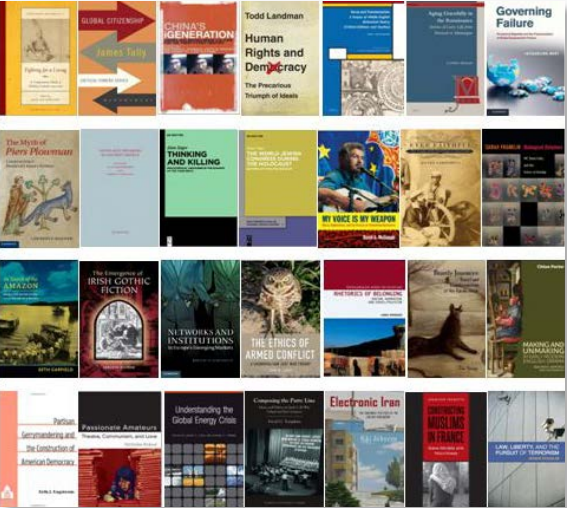Interview with KU Pilot Authors Eugene Coyle and Richard Simmons
Knowledge Unlatched asked authors who took part in the KU Pilot about their experiences of Open Access and the KU approach.
You can read the second interview with Eugene D. Coyle and Richard A. Simmons, authors of Understanding the Global Energy Crisis, below (Purdue University Press).
What were your hopes for your book, and do you think Open Access has played a role in achieving them?
Our book aims to achieve several diverse goals among a wide range of audiences. First and foremost, our book seeks to make the technological challenges of energy more readily understood by non-technical audiences, and simultaneously to improve the social consciousness and policy-awareness of technologists. I had and continue to have hopes of reaching an upper-undergraduate level audience via interdisciplinary studies (primarily bridging engineering/physical science with social/political science). I feel that the book is and will continue to realize its goals, and that the Open Access feature is a critical part of that. I have additional hopes that our book will reach stakeholders in industry and government, as well as general audiences who have a particular interest in the subject matter. Open Access has and will remain an imperative role in reaching this broader audience.
Knowledge Unlatched is an absolutely stellar program that has tangibly expanded the reach of “Understanding the Global Energy Crisis.”
Do you think that making your book available on an OA licence has increased its reach and impact? – Have you seen any concrete indications of this?
Absolutely. I admit to initially being slightly uncertain (in late 2013) about how the OA license would influence the book’s ability to achieve stated goals, but can confirm that I am now delighted with the decision to make it available via OA license. Sustainable Open Access has proven to be a progressive and innovative concept that lives up to its name. Regarding reach, there is no question that our potential audience is many-fold greater than it would have otherwise been, and we have statistical data to corroborate that. Impact, however, is a bit more difficult to gauge. While many well-intending people will download our book because it is free to them, it is complicated to assess how they will use it, how it may impact their field, or fulfill our broader vision. I have asked myself whether granting the title “for free” to users may not in some regards convey (even in an unintended or subliminal way), that it is worth nothing. While I do not think most users would leave with such an impression, “free download” can have unintended meanings.
Regarding reach, there is no question that our potential audience is many-fold greater than it would have otherwise been, and we have statistical data to corroborate that.
Within my immediate community, I have seen our book utilized as a reading resource for specific lesson plans in multiple undergraduate courses. Because it is available Open Access, we know that students were not burdened financially to obtain it, and that instructors could feel more at liberty to assign readings and develop lesson plans around the text and its case studies.
I have recently learned that a high school system in North Carolina has included our text in a list of recommended readings for instructors around a new curriculum of courses in earth and environmental science that discuss energy and climate. Because this text is available to them at no cost, it is more likely to be read and utilized for educational outreach among secondary level instructors and ultimately students. Because I have learned that it is of interest to this audience, I will likely engage further and possibly develop adaptations for high-school level audiences. These potential opportunities have clearly been “unlatched” by the Open Access license!
What other benefits have you seen from participating in the KU Pilot?
First, I have personally enjoyed perusing the list of 27 other titles and even downloading several of them myself. Second, I have enjoyed sharing details about the pilot collection and the KU program with colleagues in a diverse range of fields, including academia, business, government, and among personal acquaintances. Third, I have enjoyed the enjoyed reading the recent report in Cultural Science Journal and learning more about the entire process. I plan to share the great news with others about the successful pilot.
How have you been promoting your OA book?
We have used a combination of conventional methods to promote our OA text. This has included: book launches in the U.S. and Europe, mailings via post and email, word-of-mouth, special seminars and panels, news releases in periodicals, and distribution of OA download links to interested students and faculty. The reception has been positive, and certainly enhanced by virtue of the text’s OA availability.
I believe that the benefits in terms of reach, and hopefully impact, have been outweighed by any concern over lack of total revenue.
Has your opinion about OA in general changed since your book was published through the Knowledge Unlatched Pilot? If so, how?
As I noted above, I was initially (ca. 2013) moderately uncertain about the practical logistics of the program and its potential curtailment of print sales. However, our text was primarily conceived as an educational tool and intended for as broad an audience as possible. In addition, our publisher (Purdue University Press) has extensive experience publishing similar works, and provided us (the two editors) timely counsel and advice regarding the potential benefits of the KU program. Now that I have witnessed the broader reach made possible by the program, and the reasonable compensation via up front title fees, I believe that the benefits in terms of reach, and hopefully impact, have been outweighed by any concern over lack of total revenue. In sum, my opinion about the program has changed in a very favourable way since publication about one year ago.
The Knowledge Unlatched Pilot Collection
What do your friends/colleagues now think about your decision to allow your book to be made available for free under a CC licence? Has their opinion changed following publication through Knowledge Unlatched?
I have not deeply explored this question, but I suspect that given the additional detail and feedback from the first 6-12 months of the program, friends and colleagues would largely share my views. Generalizing this, however, may be complicated. Opinions of the concept are probably highly dependent upon the nature of the work, the prospective audience, and the intentions of the author/editor/publisher in developing and promoting the work. In my case, we’ve written a very timely, pragmatic, non-fiction text on a technical topic of societal interest, initially to an anchor audience; and have hopes of expanding the reach well beyond our core audience. For this, the model seems to have worked extremely efficiently.
Are there any improvements that KU could make for its next collections, from an author’s perspective?
I would be most interested in means of differentiating between reach and impact. Clearly there are statistical/survey tools that help inform authors and program associates regarding number of downloads. I would encourage my KU colleagues to explore ideas for monitoring impact. I have some thoughts on this, including the opportunity to follow-up, or retain contact information from users (that are agreeable with these terms). It would be extremely helpful to know anything further about the use of a text after it is downloaded (as well as how the user came to learn about the text). Without burdening users extensively, certainly there are precedents from other models that could be applicable here to obtain any additional feedback from users (either upfront or after some period of time).
I have asked myself whether granting the title “for free” to users may not in some regards convey (even in an unintended or subliminal way), that it is worth nothing.
While I understand the process by which the participating libraries pooled their resources, I am slightly unfamiliar with the process by which individual title fees were negotiated relative to the sister works of the collection. That being a business decision made by our publisher, I would not expect to know all the details. However, are there any metrics by which relative title fees were established? Regarding program sustainability, is there any expectation to connect download data (“reach”) with performance of specific titles in the program? The gist of what I am conveying here is some means by which the unlatching fee can be connected (iteratively, or after the fact) to its apparent public response and impact. While this is obviously famously complex to predict in advance of a release, it seems that there should be a methodical correlation. Books with greater potential social/public value (recognizing this is highly subjective and uncertain) may not only make more sense for the program, but stand the likelihood of generating more interest among libraries and prospective readers. Is it the intent of the title fees to reflect that?
Has there been any thought given to post-assessment of reach/impact, whereby some reward may be made available if a minimum number of downloads is reached? Obviously, this would need to be monitored for potential fraudulent abuse (many downloads by a given user, for example), but the concept of connecting post launch impact to up-front unlatching may be worth exploring in the future.
Finally, to expand on an earlier comment, I have asked myself whether granting the title “for free” to users may not in some regards convey (even in an unintended or subliminal way), that it is worth nothing. This would be unfortunate, but may be inevitable with the KU program as it is designed. Has there been any thought to explore this further (or review other models), which are perhaps “very low cost” (i.e., $0.99, like I-tunes), or downloaded in exchange for other information (i.e., quick questionnaire on how the text will be used, e.g., National Academies publications)? Ideas to address these issues would be of interest to me.
Knowledge Unlatched represents a timely, innovative, and altogether new forum to facilitate this dialogue! Bravo and Thank you!
Any other comments?
Knowledge Unlatched is an absolutely stellar program that has tangibly expanded the reach of “Understanding the Global Energy Crisis.” I am excited that our title was included in the pilot collection, and even more eager to see how its impact will be multiplied as a direct result of its Open Access availability. Throughout our text, we have sought to engage a diverse range stakeholders and provide novel venues for dialogue between engineers and policymakers. Knowledge Unlatched represents a timely, innovative, and altogether new forum to facilitate this dialogue! Bravo and Thank you!
Eugene D. Coyle is Dean of the Military Technological College of the Sultanate of Oman. He was previously a faculty member at the Dublin Institute of Technology, Ireland, where he held the (Professorial) Chair of Electrical Engineering Systems and was Head of School. Dr. Coyle's research contributions span renewable energies, power quality, biomedical engineering, and engineering education.
Richard A. Simmons is a licensed professional engineer (PE) whose career has concentrated in the design and development of automotive technologies, advanced materials, and alternative fuels. Richard holds degrees in mechanical engineering from Georgia Institute of Technology (BS 1993) and Purdue University (MS 1995), where he has recently returned to pursue his doctorate. From 2009 to 2012, Rich served a AAAS science and technology policy fellowship at the U.S. Department of State, providing technical and economic analysis for international policy issues related to renewable energy during the establishment of the Department’s Bureau of Energy Resources. Prior to that, he led automotive projects in thermal science and advanced machinery design, including the conversion of alternative fuels. Rich is currently the Executive Director for Research at Purdue’s Air Transport Institute for Environmental Sustainability, and holds multiple patents.
You can read the first interview with Jennifer Fredette, author of Constructing Muslims in France here (Temple University Press).
Read our pre-Pilot author interviews in the Featured Authors section.





